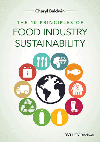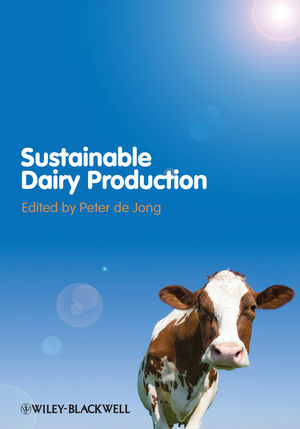Unilever plant receives sustainability award
The U.S. Dairy Sustainability Awards program of the Innovation Center for U.S. Dairy honors dairy processors, dairy farms and businesses that reduced their environmental impact.

Winners of the 2013 U.S. Dairy Sustainability Awards (from left): Dan Rice, Prairieland Dairy; Steve Ballard, Ballard Family Dairy & Cheese; Renee Jacobs, Green Valley Dairy; Kam Fierstine, Unilever; Mark Petersen, Petersen Dairy Farm; and Dan DeGroot, Skyridge Farms.



An ice cream plant and a cheese plant were among the dairy processors honored in April in the 2013 U.S. Dairy Sustainability Awards program of the Innovation Center for U.S. Dairy, Rosemont, Ill.
The Unilever Ice Cream plant in Henderson, Nev., was recognized for Outstanding Dairy Processing & Manufacturing Sustainability. It has reduced its electricity use by 13%, natural gas use by 16% and water consumption by more than 1.1 million gallons per year.
Ballard Family Dairy & Cheese, Gooding, Idaho, was honored for Outstanding Achievement in Energy Efficiency. The Innovation Center announced the winners at its meeting in Washington, D.C., on April 23. Other award recipients are:
Outstanding Dairy Farm Sustainability
- Petersen Dairy Farm, Appleton, Wis.
- Prairieland Dairy, Firth, Neb.
- Skyridge Farms, Sunnyside, Wash.
- Honorable mention: McCarty Family Farms, Rexford, Kan.
Outstanding Achievement in Renewable Energy
- Green Valley Dairy, Krakow, Wis.
- Honorable mention: Fulper Family Farmstead, Lambertville, N.J.
“The strength of the award winners’ stories illustrates why consumers can be confident about choosing their favorite dairy foods and beverages,” said Barbara O’Brien, president of the Innovation Center for U.S. Dairy, which was founded by dairy producers. “These and thousands of other actions being taken every day — both large and small — contribute to the industry’s overall commitment to a healthy future for the next generation.”
The winners were selected based on results that delivered triple-bottom-line results to advance economic, environmental and social sustainability.
Unilever’s Henderson, Nev., plant manufactures ice cream products under brand names including Ben & Jerry’s, Breyers, Good Humor, Klondike and Popsicle. It has more than 450 employees and has been in operation for 30-plus years.
According to Unilever, “sustainability is a corporate-wide way of doing business.” In 2010, Unilever unveiled its Sustainable Living Plan with goals to reduce three outputs by 50% by 2020: greenhouse gas (GHG) emissions, water use associated with consumer use of their products; and waste associated with disposal of their products.
Through the implementation of technology, the Henderson plant has reduced electricity use by 13%, natural gas use by 16% and water consumption by more than 1.1 million gallons per year. Unilever focused on system upgrades, waste-water system improvements and utility monitoring.
Systems upgrades and benefits
The plant enlisted energy experts to review the facility’s major energy users in order to develop specific projects to reduce energy. The plant implemented new, automated sequencing for its refrigeration and compressed air systems, and addressed opportunities to improve energy use for water heating systems.
The systems upgrades implemented by Unilever have increased refrigeration system efficiency by 13.5%, reduced compressed air system energy use by more than 20% and recovered heat equal to one-sixth of the facility’s 2009 natural gas use rate. These upgrades reduced electricity usage by 13% and natural gas use by 16%.
Other award-winning practices include waste water system improvements and installing a utility monitoring system. The plant reduced water consumption by more than 1.1 million gallons per year. Utility monitoring tracks how new practices directly impacted energy use in specific areas. That information was then used to track additional benefits, such as reductions in maintenance costs. The monitoring system could pinpoint detailed variations in energy and water use so that each improvement practice could be evaluated.
Ballard’s cheese plant
Ballard Family Dairy and Cheese is a 35-acre dairy in Gooding, Idaho, started in 1995 by Steve and Stacie Ballard with their son Travis, the family added a cheese facility adjacent to their barn in 2004 to take advantage of the milk from their Jersey herd.
The Ballards sought ways to reduce costs and viewed energy efficiency as a way to improve financial security, environmental impact and quality of life at their dairy. The family set a goal of reducing overhead by 10% and eliminating propane use.
An energy audit and a team of energy management experts helped design a comprehensive plan to achieve their goals. Multiple energy improvements, including solar thermal power for the hot water system, led to significant savings.
The Ballards replaced the boiler system with an evacuated tube collector solar thermal supply, heat pump and high-efficiency electric boiler. In making these upgrades, the dairy was able to switch from propane to all-electric, which resulted in a 50% reduction in fossil fuel use (due to the electric provider’s energy mix).
The new system has helped the Ballards achieve a 67% energy savings. Solar thermal now supplies approximately 50% of their heating load. Designed to meet the needs of the dairy as it expands, the hot water system has already resulted in $15,000 in savings and a carbon dioxide reduction of 89,500 pounds.
The milk cooling system originally carried fresh milk at 100F through a heat exchanger that used 60F ground water to cool the milk. The milk left the heat exchanger at 80F and was further cooled to 40F in a chiller. The new system uses residual 40F cold water from the heat pump system. This pre-cools the milk to 60F and results in the chiller cooling the milk to 40F. The Ballards also added a more efficient plate heat exchanger. By making a change to the milk cooling system, the Ballards identified an opportunity to reduce water use and save money. The upgrades save an estimated 1,000 gallons daily and provide relief to the depleted local aquifer.
McCarty Family Farms has a unique “cow to cup” partnership with yogurt maker Dannon, White Plains, N.Y. The addition of an on-site processing plant has improved economic stability while aggressively reducing their environmental impact. The plant has yielded significant progress toward the dairy’s water reduction goal. Approximately 59,400 gallons of raw milk from the three dairies are processed through an evaporator every day to remove excess water before being separated into cream and skim milk. Every drop of the water removed during the evaporation process — 39,000 gallons per day — is reused throughout the dairies.
A diverse panel of judges
A judging panel made the final assessment and selection. The panel is comprised of the following individuals:
- Robert Bonnie, United States Department of Agriculture
- Jason Clay, Market Transformation, World Wildlife Fund
- Larry Elworth, United States Environmental Protection Agency
- Molly Jahn, Laboratory Genetics and Department of Agronomy, University of Wisconsin - Madison
- Larry Jensen, Innovation Center for U.S. Dairy and president, Leprino Foods
- Steve Larson, Hoard’s Dairyman
- James Linn, Department of Animal Science, University of Minnesota and past, past president American Dairy Science Association
- Joel Makower, GreenBiz Group Inc.
- Randy Mooney, dairy producer and chairman, National Milk Producers Federation
- Gatz Riddell, American Association of Bovine Practitioners
- Paul Rovey, chairman, Dairy Management Inc. and owner, Rovey Dairy
- Brian Sloboda, Cooperative Research Network, National Rural Electric Cooperative Association
- Connie Tipton, International Dairy Foods Association
- Jason Weller, Natural Resources Conservation Service, USDA
- Jim Carper, chief editor, Dairy Foods
The panel also includes two winners from the inaugural Awards program in 2012:
- Mike Brubaker, Brubaker Farms
- Steve Rowe, Darigold
Read more about the awards and all the winners on the Sustainability Awards Pages.
Looking for a reprint of this article?
From high-res PDFs to custom plaques, order your copy today!






